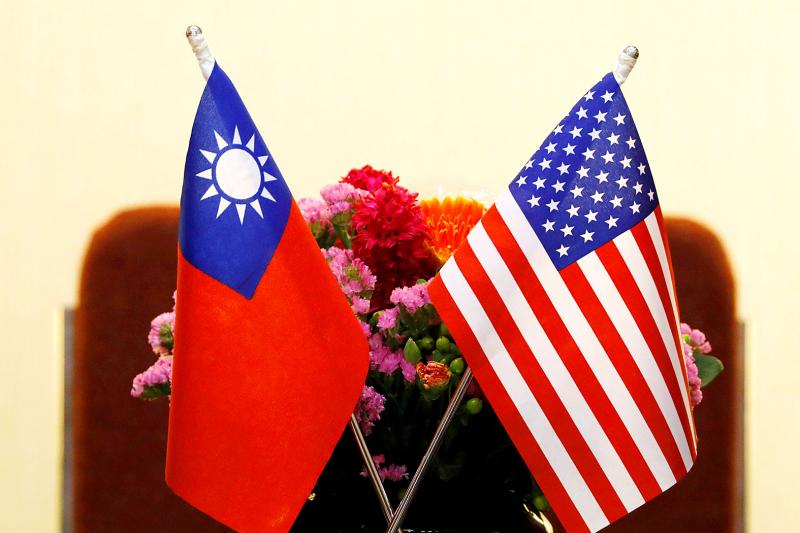The US government has approved a proposed US$108 million sale of technical support and equipment for tanks and combat vehicles to Taiwan, the fourth arms sale to the nation that Washington has authorized this year.
The sale would include unclassified spare and repair parts, assembly for tanks and combat vehicles, logistical technical assistance, and technical and logistical support by the US government and contractors, the US Defense Security Cooperation Agency said in a news release on Friday.
The agency said it notified the US Congress of the possible sale that day, after it was approved by the US Department of State.

Photo: Reuters
The deal would enhance the Taiwanese armed forces’ ability to “meet current and future threats” by contributing to the maintenance of their “vehicles, small arms, combat weapon systems and logistical support items,” the agency said.
In addition to supporting Taiwan’s efforts to “modernize its armed forces and to maintain a credible defensive capability,” the sale would also enhance the nation’s interoperability with the US and other partners, it said.
The agency said the sale would be “consistent with US law and policy,” and serve “US national, economic and security interests.”
In Taipei, the Ministry of National Defense said the deal would help the military maintain sufficient equipment and spare parts of its military vehicles, and support its training for combat readiness at a time when Taiwan is facing “increased military threats” from China.
The ministry said the deal is expected to take effect one month after Congress is notified of it.
In a separate statement, the Presidential Office thanked the US for approving the arms deal, saying it was the fifth such sale to Taiwan that Washington has announced since US President Joe Biden took office in January last year, and the fourth this year.
This demonstrated the US’ commitment to Taiwan’s security, Presidential Office spokesman Xavier Chang (張惇涵) said in the statement.
The government would continue to demonstrate its resolve to safeguard Taiwan, and preserve the nation’s free and democratic way of life by elevating it defense capability, Chang said.
Taiwan is committed to working with partners around the world to contribute to peace and stability in the Indo-Pacific region and the world, he added.

A Ministry of Foreign Affairs official yesterday said that a delegation that visited China for an APEC meeting did not receive any kind of treatment that downgraded Taiwan’s sovereignty. Department of International Organizations Director-General Jonathan Sun (孫儉元) said that he and a group of ministry officials visited Shenzhen, China, to attend the APEC Informal Senior Officials’ Meeting last month. The trip went “smoothly and safely” for all Taiwanese delegates, as the Chinese side arranged the trip in accordance with long-standing practices, Sun said at the ministry’s weekly briefing. The Taiwanese group did not encounter any political suppression, he said. Sun made the remarks when

PREPAREDNESS: Given the difficulty of importing ammunition during wartime, the Ministry of National Defense said it would prioritize ‘coproduction’ partnerships A newly formed unit of the Marine Corps tasked with land-based security operations has recently replaced its aging, domestically produced rifles with more advanced, US-made M4A1 rifles, a source said yesterday. The unnamed source familiar with the matter said the First Security Battalion of the Marine Corps’ Air Defense and Base Guard Group has replaced its older T65K2 rifles, which have been in service since the late 1980s, with the newly received M4A1s. The source did not say exactly when the upgrade took place or how many M4A1s were issued to the battalion. The confirmation came after Chinese-language media reported

The Taiwanese passport ranked 33rd in a global listing of passports by convenience this month, rising three places from last month’s ranking, but matching its position in January last year. The Henley Passport Index, an international ranking of passports by the number of designations its holder can travel to without a visa, showed that the Taiwan passport enables holders to travel to 139 countries and territories without a visa. Singapore’s passport was ranked the most powerful with visa-free access to 192 destinations out of 227, according to the index published on Tuesday by UK-based migration investment consultancy firm Henley and Partners. Japan’s and

BROAD AGREEMENT: The two are nearing a trade deal to reduce Taiwan’s tariff to 15% and a commitment for TSMC to build five more fabs, a ‘New York Times’ report said Taiwan and the US have reached a broad consensus on a trade deal, the Executive Yuan’s Office of Trade Negotiations said yesterday, after a report said that Washington is set to reduce Taiwan’s tariff rate to 15 percent. The New York Times on Monday reported that the two nations are nearing a trade deal to reduce Taiwan’s tariff rate to 15 percent and commit Taiwan Semiconductor Manufacturing Co (TSMC, 台積電) to building at least five more facilities in the US. “The agreement, which has been under negotiation for months, is being legally scrubbed and could be announced this month,” the paper said,